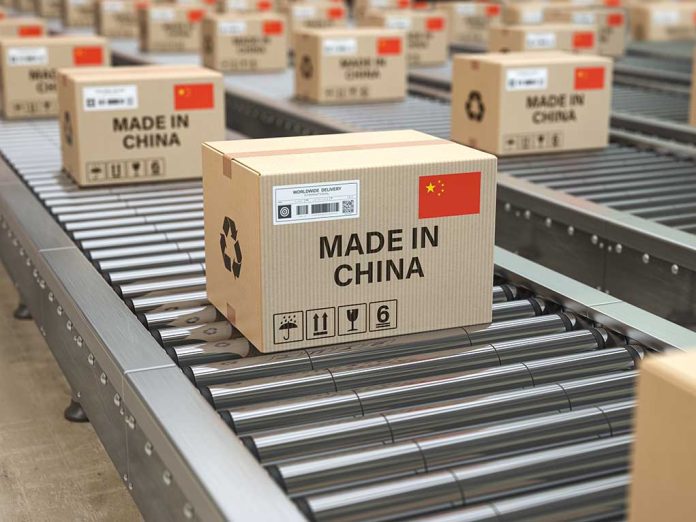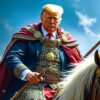🔴 Website 👉 https://u-s-news.com/
Telegram 👉 https://t.me/usnewscom_channel
Steve Madden’s bold move to slash Chinese imports by 45% in just one year signals a seismic shift in global trade dynamics, as the shoe giant braces for impact following Trump’s re-election.
At a Glance
- Steve Madden plans to reduce Chinese imports by 45% over the next year
- Decision follows Trump’s re-election and potential 60% tariffs on Chinese goods
- CEO explores sourcing alternatives in Brazil, Cambodia, Mexico, and Vietnam
- Currently, 70% of Steve Madden’s imports come from China
- Move could impact China’s exports by $200 billion, according to experts
Steve Madden’s Strategic Pivot
In a stunning response to Donald Trump’s re-election and the looming threat of skyrocketing tariffs, Steve Madden has announced a radical overhaul of its supply chain. The footwear giant, currently sourcing 70% of its products from China, aims to slash that dependency by nearly half within a year. This bold strategy underscores the far-reaching implications of Trump’s hardline stance on China and signals a potential exodus of American companies from the world’s second-largest economy.
CEO Edward Rosenfeld didn’t mince words when outlining the company’s plans. “As of yesterday morning, we are putting that plan into motion,” he stated, adding, “And you should expect to see the percentage of goods that we sourced from China to begin to come down more rapidly going forward.” This decisive action demonstrates how quickly American businesses are adapting to the new political landscape, prioritizing economic stability over long-standing supply chain relationships.
Steven Madden executives said they are accelerating plans to shift sourcing out of China to other countries after Donald Trump’s victory in the US presidential election https://t.co/PjazDad3AR
— Bloomberg Markets (@markets) November 7, 2024
Trump’s China Policy: A Game-Changer for Global Trade
The catalyst for Steve Madden’s drastic measures lies in Trump’s aggressive China policy. During his first term, Trump imposed tariffs of up to 25% on Chinese imports, and his re-election campaign promised even tougher measures. The president-elect has even threatened a staggering 150% to 200% tariff on Chinese goods if China invades Taiwan, a move that would decimate trade relations between the world’s two largest economies.
“I would say: If you go into Taiwan, I’m sorry to do this, I’m going to tax you at 150% to 200%.” – Donald Trump
This hardline approach has sent shockwaves through the business world, forcing companies like Steve Madden to reevaluate their entire supply chain strategies. The potential for 60% tariffs on Chinese imports is not just a threat to individual businesses; it’s a challenge to the entire global trade system that has been built over decades.
The Ripple Effect on China’s Economy
The implications of Steve Madden’s decision extend far beyond the company’s balance sheet. Zhu Baoliang, a prominent Chinese economist, estimates that a 60% tariff could reduce China’s exports by a staggering $200 billion. This potential loss comes at a time when China’s economy is already showing signs of strain, with the International Monetary Fund projecting growth to slow to 4.8% in 2024 and further to 4.5% the following year.
The Chinese yuan’s six-week slide against the dollar further underscores the market’s growing concerns about the future of Sino-American trade relations. As more companies follow Steve Madden’s lead, the cumulative effect on China’s export-driven economy could be severe, potentially reshaping the global economic landscape.
A New Era of Global Sourcing
As Steve Madden looks to reduce its reliance on Chinese manufacturing, CEO Rosenfeld has outlined a diversification strategy that includes exploring sourcing options in Brazil, Cambodia, Mexico, and Vietnam. This shift not only protects the company from potential tariffs but also opens up new opportunities for economic development in these alternative markets.
The company’s ambitious target of having just over a quarter of its business subject to potential Chinese tariffs within a year is a testament to the urgency felt by American businesses in the face of changing political and economic realities. It’s a stark reminder that in the world of global trade, adaptability is not just an asset — it’s a necessity for survival.
As Steve Madden leads the charge in reducing dependence on Chinese manufacturing, it sets a precedent that could inspire a wave of similar moves across various industries. This shift has the potential to redraw the map of global manufacturing hubs and create new economic powerhouses in the process. The coming years will undoubtedly be a critical period of transition, not just for Steve Madden, but for the entire landscape of international trade and economic relations.

